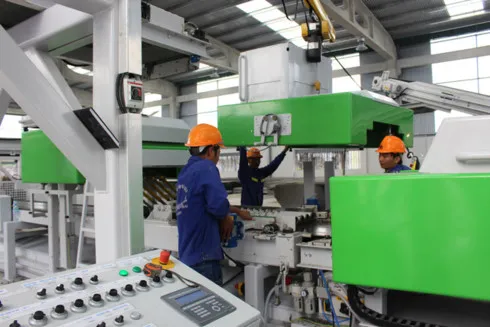Competitive clean tech has already arrived in Vietnam

Speaking at a recent environmental forum in Hanoi, KITECH officials argued the failure to make quicker progress is a result of the failure to convince all the key domestic companies of clean tech benefits compared to dirty fossil fuel alternatives.
Transnationals have proven that it is possible to slash harmful emissions from fossil fuels and yet continue along the development path, said Pham Thi Thanh Hang, deputy director of a Hanoi based small business centre and think tank.
Miss Hang noted that less than half of 400 domestic companies recently surveyed by the centre had a solid understanding of the benefits of environment friendly technologies and how they could benefit production, sales and earnings.
So,the central question for the government, she noted, is how to get the word out to small local businesses and demonstrate to them how clean technologies deliver greater benefits in the long run than incumbent polluting technologies.
Only then will they begin to embrace clean tech and make it the default option for future capital outlay decisions.
Tran Van Tuan, of the Envic Environmental Technology Joint Stock Company in turn told the audience that local companies far too often calculate that in the short term it is less expensive to use dirty fossil fuels.
Mr Tuan submitted that these companies do not factor environmental damage into their short-sighted decisions and suggest that the government give effect to carbon pricing to correct the situation and prevent them for polluting for free.
The money raised by the tax could be set aside in a special governmental fund and earmarked to provide subsidies to local businesses to help them install renewable energy technologies and thereby compete on a more equal footing with dirty fossil fuels.
In addition, colleges and universities throughout the country should establish business courses teaching tomorrows business leaders of natural capital accounting techniques that highlight the undervalued economic benefits generated by sustainable business models and better address the costs associated with dirty technologies.
Lastly, Dao Xuan Lam, director of the Agricultural Trade and Environmental Technology Co, Ltd, zeroed in on the point that those at the conference and local companies should not miss the reality that is staring them in the face— that in many areas clean technologies are already clearly more competitive than dirty technologies.
This simple truth is evident everywhere in Vietnam that one looks, said Mr Lam.
LED lighting is a prime example as well as the emergence of electric motorbikes and autos, both technologies that are and could be further implanted in the country today with tremendous benefits for the economy and society.
As well, transnational companies all report long term commitments to slash long term emissions, achieve zero waste status and source all their energy from renewable sources by as early as 2020.
And they are doing this by themselves without any special incentives provided by the government, because it makes good economic sense to do so.
Mr Lam cited his own company as a prime example. My company has held clean tech and dirty fossil fuels tech investments to the same standard with respect to any capital outlay decision made.
Our decisions are in line with the experience of transnationals and we have consistently come down in favour of clean tech because it helps lower costs as well as boost top line sales and bottom line earnings.
Smart transnationals are not investing in wind and solar in Vietnam because of climate change obligations, they are doing it because they know that the country is the right location for these modern technologies and they offer the cheapest means of providing much needed power.
My company will continue to invest in waste reduction, biomass and solar power, and energy efficiency measures, because these are the most lucrative and cost-effective investments currently available in Vietnam.
For local business leaders, Mr Lam concluded, the answer lies in a nationwide marketing effort to demonstrate once and for all that clean tech investments are not being made out of charity, they are being made because these technologies make compelling business, financial, and economic sense.





